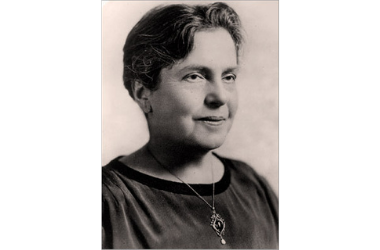Blog
For Women’s History Month, we are highlighting a few of the many dedicated women whose work continues to inspire and influence our nation's healthcare and save lives.
One of the most compelling voices in nursing came from Lillian D. Wald (1867-1940), a Public Health Advocate whose work inspired the field of public health nursing, which, among other things, recognizes that everyone is entitled to the best possible care whether or not they can afford it.
 After graduating as a nurse, she studied to become a doctor. Following a shocking tour of tenement housing in New York’s Lower East Side, Wald left medical school to found the Nurses’ Settlement at Henry Street to better the poor state of health she found there. By charging for medical care on a sliding scale, the organization sought to make healthcare affordable.
After graduating as a nurse, she studied to become a doctor. Following a shocking tour of tenement housing in New York’s Lower East Side, Wald left medical school to found the Nurses’ Settlement at Henry Street to better the poor state of health she found there. By charging for medical care on a sliding scale, the organization sought to make healthcare affordable.
The result of this new program was a measurable improvement in the overall health of the community. This paved the way for the founding of the National Federation of Settlements, dedicated to providing medical aid and public services to communities desperately in need. Eventually, this became the field of public health nursing we know today. Wald was the first chairperson of the National Organization for Public Health Nursing, which worked to make the field its own profession.
Karen Clement-O’Brien, Doctor of Nursing Practice, Board Certified Family Nurse Practitioner, is the Director of Professional Practice and the Magnet Program Director for Saratoga Hospital. She says this great humanitarian is one of her personal heroes.
“Lillian D. Wald’s influence on the quality of care for the poor and indigent was profound. Wald transformed the concept of equality healthcare, addressing gender, racial, and low-income bias against patients of the time,” Clement-O’Brien says. “Additionally, by elevating nursing as a profession in a separate field from medicine, she gave autonomy to nursing, helping to establish better benefits and pay, enabling women to develop their own careers independent of husbands and family. Her influence in all these areas is still felt today.”
Wald’s work enabled her to address healthcare in the context of societal needs, many of which were the root of poor health. Among other things, she is known for:
- Helping the poor,
- Recommending a national health insurance plan,
- Cutting back the amount of time patients spent in hospitals,
- Establishing a visiting nurses association,
- Working for fair labor practices,
- Fighting to end child labor, and
- Helping to found the National Association for the Advancement of Colored People (NAACP).
Wald was credited with coining the term “public health nurse” as well as establishing the Visiting Nurse Service of New York, one of the oldest nonprofit home health care agencies in the country. She worked to provide healthcare for people in their homes without bias whatsoever their living conditions.
Clement-O’Brien says her favorite quote from Lillian Wald embodies the full spirit of service in public health nursing that still holds true today. It is also an example of the role she played in shaping the American conscience.
“Nursing is love in action,” said Wald, “and there is no finer manifestation of it than the care of the poor and disabled in their own homes.”
Wald received numerous awards and accolades throughout her life, including a Presidential Commendation from President Franklin D. Roosevelt. In 1922, the New York Times named Wald as one of the country’s greatest living women. In 1970, Wald was posthumously recognized for her pioneering work and extraordinary breadth of public service when she was elected to the Hall of Fame for Great Americans located in New York City, the first hall of fame in the United States.
According to Clement-O’Brien, nursing is both a science and an art. She describes medicine as more focused on care of disease, while nursing focuses on the care of the response to illness and disease. Wald recognized the importance of that distinction, as it takes into account the whole patient, including access to care, affordability of care, continuance of care once the patient returns home, and any other barriers to care.
“At the time, the fight for these changes was a Herculean effort, especially for a woman,” Clement-O’Brien says. “I think it’s important to note the qualities Wald embodied that enabled her to be a change agent with national and global influence. She was a tenacious leader who did not hesitate to go after what she felt was right and necessary. She believed that reform could be accomplished only when attitudes are changed, a philosophy that helped her succeed. She also empowered women along the way by supporting their advancement. Lillian Wald is an inspiration worth modeling by all of us and anyone entering the field.”
You can learn more about professional nursing at Saratoga Hospital here, where you can also find career opportunities and listen to what our nurses have to say in our Voices of Saratoga Hospital video series. For more information, visit SaratogaHospital.org.

